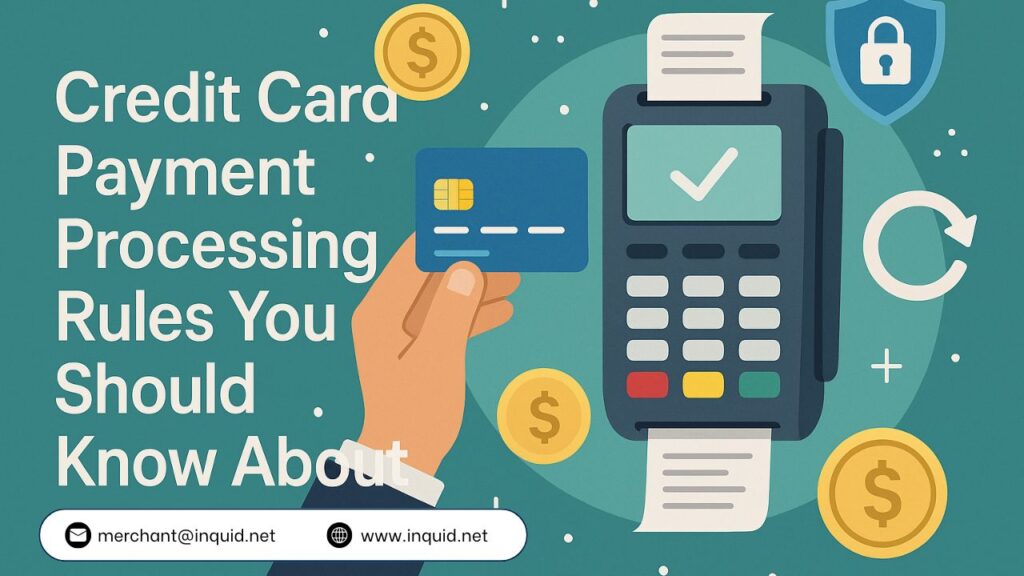
Accepting credit card payments might seem simple at a glance, but it comes with a set of rules that merchants need to follow carefully. Whether you’re running a physical store, an eCommerce site, or a service-based business, staying on the right side of payment regulations helps you avoid penalties, disputes, and interruptions in your cash flow.
In this blog, we’ll break down the core rules around credit card payment processing that every business should understand—and follow.
1. Know the Rules Set by Card Networks
Visa, Mastercard, American Express, and Discover each have their own operating guidelines. These rules govern how transactions should be handled, what information must be stored securely, how disputes are resolved, and how chargebacks work.
Merchants are expected to comply with these standards whether they accept payments online, in person, or over the phone. Not following these rules can lead to increased chargebacks, higher processing costs, or even termination of your merchant account.
Tip: Review the card brands’ official guidelines or ask your payment processor for a compliance summary to stay up to date.
2. Understand PCI DSS Compliance
The Payment Card Industry Data Security Standard (PCI DSS) exists to protect cardholder information. If your business accepts, stores, or transmits credit card data, you need to comply with these security standards.
This means using secure payment gateways, maintaining up-to-date firewalls, and avoiding storing sensitive cardholder data unnecessarily. Non-compliance doesn’t just pose a security risk—it can also result in hefty fines if a data breach occurs.
For small businesses using third-party processors, some of this responsibility is shared, but you’re still expected to follow basic best practices for data handling.
3. Be Transparent About Fees
Surprise charges can lead to unhappy customers and increased disputes. You must clearly communicate any additional charges, such as convenience fees or credit card surcharges, before the transaction is processed.
Make sure your billing policies are easy to understand, and that receipts accurately reflect what the customer was charged.
If you’re unclear about what processing might cost you as a merchant, this guide on credit card processing fees can help.
4. Avoid Prohibited Business Practices
Some activities are considered high-risk or restricted by card networks. For example, misrepresenting your business type or using your merchant account to process payments for another company—known as factoring—is strictly against the rules.
Other practices, like charging customers before shipping goods (without a clear timeline), can also raise red flags with payment processors. It’s important to read and understand what your provider considers acceptable use.
If you’re in a high-risk category, such as supplements, adult content, or tech support services, make sure your processor supports your industry type legally and transparently.
5. Handle Chargebacks the Right Way
Chargebacks happen when a customer disputes a transaction. Whether the complaint is legitimate or not, you’re expected to respond within a specific timeframe and provide the necessary documentation.
The key to avoiding chargebacks in credit card payment processing is to offer clear communication, prompt delivery, honest refund policies, and accurate product descriptions. If a chargeback occurs, your processor will guide you through the response process, but it is still your responsibility to provide proof of the sale.
Repeated chargebacks not only result in lost revenue, but they can also lead to account suspension or higher fees.
6. Keep Customer Data Secure
Beyond PCI rules, protecting your customers’ data should be a top priority. That means using encryption, masking card numbers, and not writing down or storing information like CVVs or expiration dates.
Using a reliable processing provider that invests in security can take a lot of the technical pressure off your team. If you’re looking for a trusted option that takes security seriously, this platform offers a well-rounded set of payment solutions that focus on safety and compliance.
7. Stay Updated With Regulatory Changes
The rules around credit card processing evolve regularly. As regulations shift, especially in response to data privacy laws and digital fraud trends, businesses must stay informed.
Working with a provider that communicates changes and offers support is crucial. Don’t wait for an issue to arise before reviewing your payment procedures.
Final Thoughts
Running a business comes with enough challenges—getting caught off guard by payment processing rules shouldn’t be one of them. By staying informed and choosing the right payment partner, you protect your business from unnecessary risk and build trust with your customers.
If you have questions about processing regulations, contact us to speak with a specialist who can help you find the right solution for your business model.

Pingback: Best High-Risk Credit Card Processing Explained
Pingback: Credit Card Processing Instant Approvals: Truth or Hype